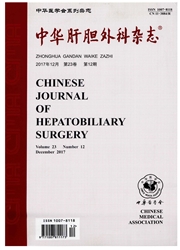

 中文摘要:
中文摘要:
目的 在构建THANK腺病毒载体的基础上,在裸鼠体内观察THANK基因转移对SMMC-7721细胞作用。方法 用THANK重组腺病毒,感染SMMC-7721细胞,获取高表达THANK基因的7721细胞,将不同7721细胞接种裸鼠,观察THANK基因转移后7721细胞的成瘤性变化,包括肿瘤生长的大小、速率,肿瘤重量、裸鼠生存期变化以及成瘤后肿瘤组织及脾脏的微观结构变化。结果 THANK在7721细胞中的表达可抑制肿瘤细胞的生长,激发机体的抗肿瘤免疫,抑制初次和再次接种的亲代7721细胞的生长,降低了7721细胞的成瘤性。光镜和电镜观察均可发现THANK的转染使得7721细胞的坏死和凋亡比例有所增高,提示THANK在裸鼠体内可能通过某种机制增强了7721细胞的凋亡比例。结论 THANK在裸鼠体内可诱发有效的抗肿瘤免疫。
 英文摘要:
英文摘要:
Objective To study the anti-tumor effects of THANK in nude mice. Methods THANK adenovirus was used to infect SMMC-7721 cells. The SMMC-7721 cells with high expression of THANK were harvested and inoculated into the mice. The tumorgenicity of THANK-transduced cells was determined. Meanwhile, the growth rate and weight of tumor, survival rate of the mice and ultrastructural changes of the tumor and spleen were observed. Results The expression of THANK in the SMMC-7721 cells not only inhibited the growth of the tumor cells but also induced a systemic immune response against the cells and re-challenged parental 7721 cells, thus decreasing the tumorgenicity of 7721 cells in nude mice. The THANK expression in the tumor increased the necrosis and apoptosis of 7721 cells, which indicates that THANK can upregulate the apoptosis of 7721 cells. Conclusions THANK transduction in SMMC-7721 cells induces effective immune response in nude mice.
 同期刊论文项目
同期刊论文项目
 同项目期刊论文
同项目期刊论文
 期刊信息
期刊信息
